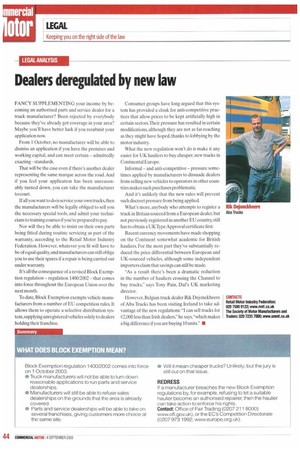LEGAL ANALYSIS
Page 44

If you've noticed an error in this article please click here to report it so we can fix it.
Dealers deregulated by new law
FANCY SUPPLEMENTING your income by becoming an authorised parts and service dealer for a truck manufacturer? Been rejected by everybody because they've already got coverage in your area? Maybe you'll have better luck if you resubmit your application now.
From 1 October, no manufacturer will be able to dismiss an application if you have the premises and working capital, and can meet certain admittedly exacting-standards.
That will be the case even if there's another dealer representing the same marque across the road. And if you feel your application has been unreasonably turned down, you can take the manufacturer to court.
If all you want to do is service your own trucks, then the manufacturers will be legally obliged to sell you the necessary special tools, and admit your technicians to training courses if you're prepared to pay.
Nor will they be able to insist on their own parts being fitted during routine servicing as part of the warranty, according to the Retail Motor Industry Federation. However, whatever you fit will have to be of equal quality, and manufacturers can still oblige you to use their spares if a repair is being carried out under warranty.
It's all the consequence of a revised Block Exemption regulation regulation 1400/2002 that comes into force throughout the European Union over the next month.
To date, Block Exemption exempts vehicle manufacturers from a number of EU competition rules. It allows them to operate a selective distribution system,supplying unregistered vehicles solely to dealers holding their franchise. Consumer groups have long argued that this system has provided a cloak for anti-competitive practices that allow prices to be kept artificially high in certain sectors. Their pressure has resulted in certain modifications, although they are not as far-reaching as they might have hoped, thanks to lobbying by the motor industry.
What the new regulation won't do is make it any easier for UK hauliers to buy cheaper, new trucks in Continental Europe.
Informal and anti-competitive pressure sometimes applied by manufacturers to dissuade dealers from selling new vehicles to operators in other countries makes such purchases problematic.
And it's unlikely that the new rules will prevent such discreet pressure from being applied.
What's more, anybody who attempts to register a truck in Britain sourced from a European dealer, but not previously registered in another EU country, still has to obtain a UK Type Approval certificate first.
Recent currency movements have made shopping on the Continent somewhat academic for British hauliers. For the most part they've substantially reduced the price differential between European and UK-sourced vehicles, although some independent importers claim that savings can still be made.
"As a result there's been a dramatic reduction in the number of hauliers crossing the Channel to buy trucks," says Tony Pain, Des UK marketing director.
However, Belgian truck dealer Rik Dejonckheere of Aba Trucks has been visiting Ireland to take advantage of the new regulations: "I can sell trucks for €2,000 less than Irish dealers," he says, "which makes a big difference if you are buying 10 units." •
















































































































































































































